35 Beautiful & Aesthetic Japanese Words & Their Meaning
Japanese words aesthetic: the meaning and beauty of the Japanese kanji words.
As someone who has studied the Japanese language and culture for 4 years, and preparing for a trip to Japan soon, I put together this fun list of aesthetic Japanese words with beautiful meanings to get you inspired!
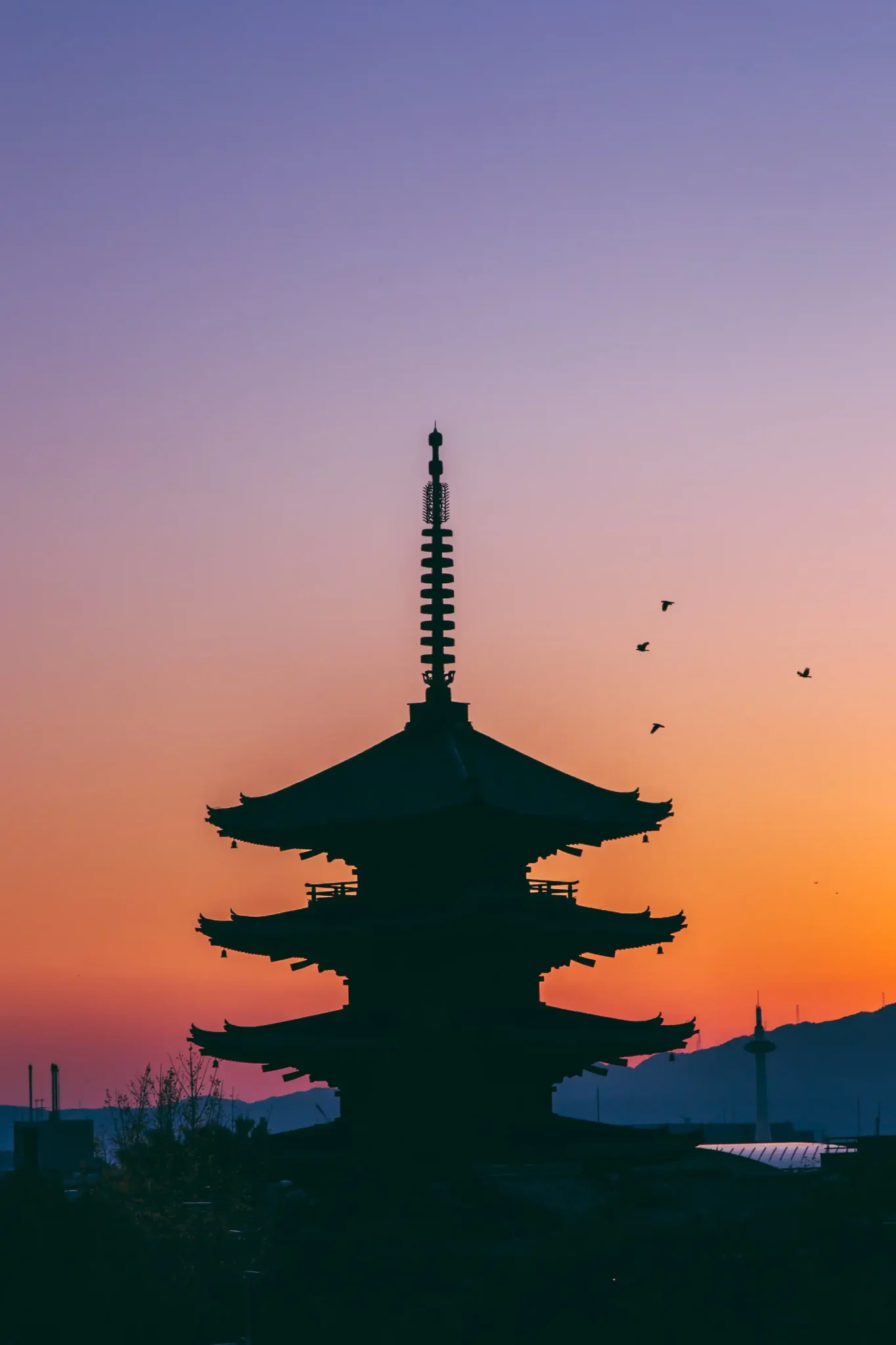
How are Japanese Words Aesthetic?
The intricate Japanese writing system elegantly combines multiple elements to allow for both brevity and nuanced expression. From the meaning of the Japanese aesthetic words to Their visual Japanese word’s aesthetic components. Its long development reflects cultural values that shape the language even today.
35 beautiful & aesthetic Japanese words and their meaning
More Japan Articles
Aesthetic Japanese words
Japanese words aesthetic
These beautiful aesthetic Japanese words convey a feeling or a sentiment so perfectly. One aspect of Japanese that I find particularly fascinating is the way in which words can convey both a deep meaning and an aesthetic quality.
and In this article, I would like to share with you 20 amazing Japanese words. These are the most beautiful Japanese words and meaningful Japanese words that have stayed with me since I learned them.
From describing the beauty of nature to capturing the essence of human emotion, these words offer a glimpse into the depth and richness of Japanese culture. I hope this gives you some inspiration before your trip to Japan (like it is for me!). So here is my personal favorite list of Japanese words with beautiful meanings! So here are a list of Japanese words aesthetic.
35 Japanese words aesthetic and their meaning
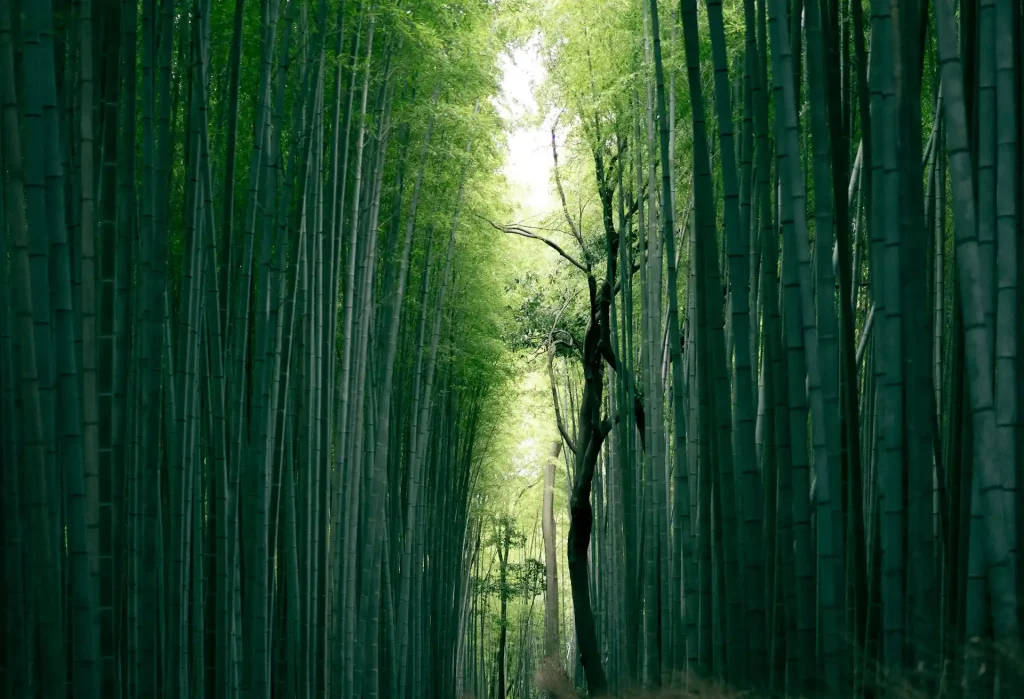
1. 空 (Sora)
sky
“Sora” is a word that refers to the vast expanse of the sky.
It represents the boundless possibilities and limitless potential of the universe and is often associated with feelings of freedom and openness.
When I hear this word, I am reminded of the importance of dreaming big and aiming high, and of the infinite possibilities.
2. 渋い (Shibui)
Subtle and Refined
“Shibui” is a beautiful Japanese word that is used to describe something that is understated and refined.
It is often used to describe traditional Japanese art and design, which emphasizes simplicity and elegance over flamboyance and excess.
This aesthetic Japanese word reminds me of the phrase “less is more” which I wholeheartedly believe and practice.
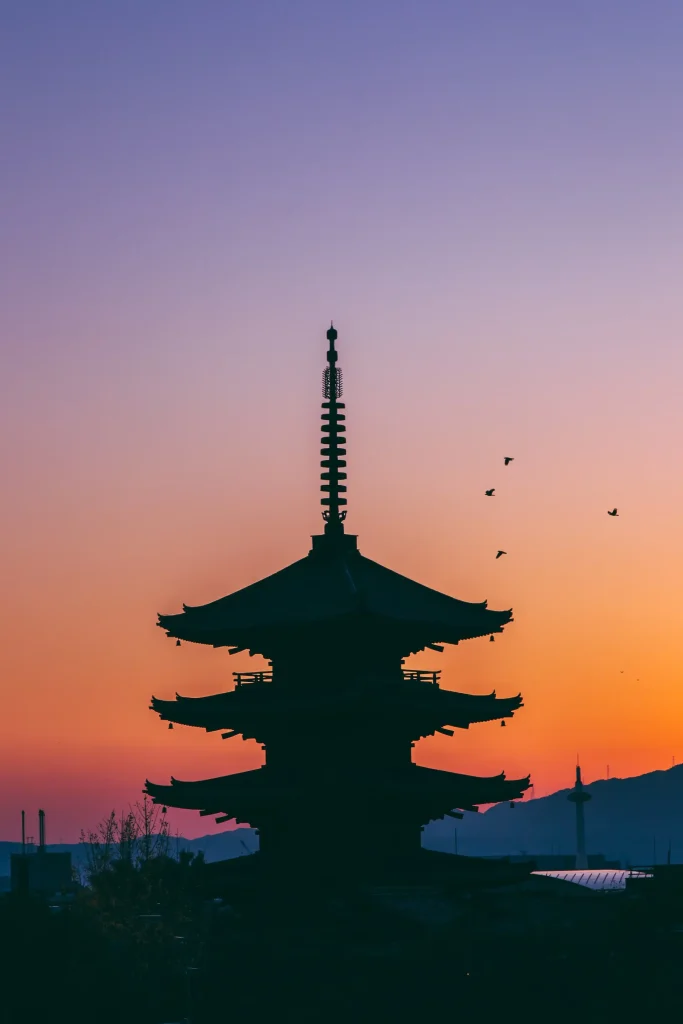
3. 幽玄 (Yugen)
Profound Mystery
“Yugen” is a Japanese word that is difficult to translate into English. It refers to a profound sense of mystery and depth that is often associated with the beauty of nature.
When I think of “Yugen”, I am reminded of the feeling I get when I gaze up at the stars on a clear night.
4. 美しい (utsukushii)
Beautiful
“utsukushii” is how you say profoundly beautiful in Japanese. This word sounds so aesthetic and beautiful. The meaning behind
it should be reserved for when you feel something is truly breathtaking.
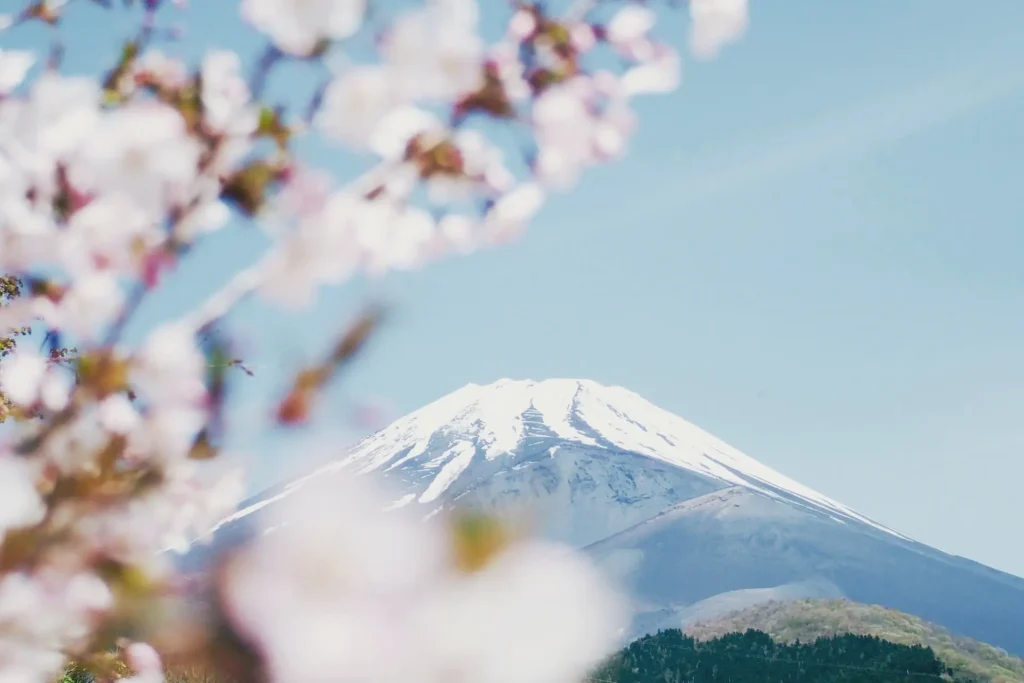
5. 風流 (Furyuu)
Grace and Elegance
“Furyuu” is a word that is used to describe a sense of grace and elegance. It is often used to describe the way that people carry themselves or the way that things are presented.
When I think of “Furyuu”, I am reminded of how a modern women carries herself with effortless grace and timeless style. Hit’s the nail on the head with this word!
6. 素朴 (Sopoku)
Simplicity and Naturalness
“Sopoku” is another beautiful Japanese word that is used to describe a sense of simplicity and naturalness.
It is often used to describe things that are unadorned and free from excess. When I think of “Sopoku”, I am reminded of the beauty of a simple, unspoiled landscape.
8. 木漏れ日 (Komorebi)
Sunlight Filtering Through Trees
“Komorebi” is another beautiful Japanese word with such aesthetic meaning, it’s used to describe the dappled sunlight that filters through trees and creates a beautiful pattern of light and shadow on the ground.
This word beautifully captures the beauty of nature and the interplay between light and shadow.
When I hear this word, I am reminded of an early peaceful morning sitting outside in my garden on a sunny day, where the gentle rustling of leaves of the Japanese maples and the warm glow of sunlight create a serene and tranquil atmosphere. So zen!
9. 空気 (Kuuki)
Atmosphere and Feeling
“Kuuki” is a aesthetic Japanese word that is used to describe the atmosphere or feeling of a place or situation. It can refer to the mood of a room, the ambiance of a city, or the vibe of a social gathering.
When I think of “Kuuki”, I am reminded of the peaceful and calming atmosphere of a Japanese tea ceremony.
Or the blissfull feeling of traveling somewhere new and closing my eyes and inhaling in the fresh air! Sounds cheezy but it’s what this butterfly like feeling means to me.
10. 落ち着く (Ochitsuku)
Calm and Soothe
“Ochitsuku” is a beautiful word in Japanese that is used to describe a sense of calm and tranquility
. It can refer to the feeling of being soothed and comforted by a peaceful environment or a kind word.
When I hear this word, I am reminded of the peaceful stillness of a Japanese Zen garden.
11. 温かみ (Atatakami)
Warmth and Kindness
“Atatakami” is a word that is used to describe a sense of warmth and kindness.
It can refer to the feeling of being welcomed and accepted by others, or the sense of comfort that comes from being surrounded by loved ones.
When I think of “Atatakami”, I am reminded of the warm and welcoming spirit of the Japanese people.
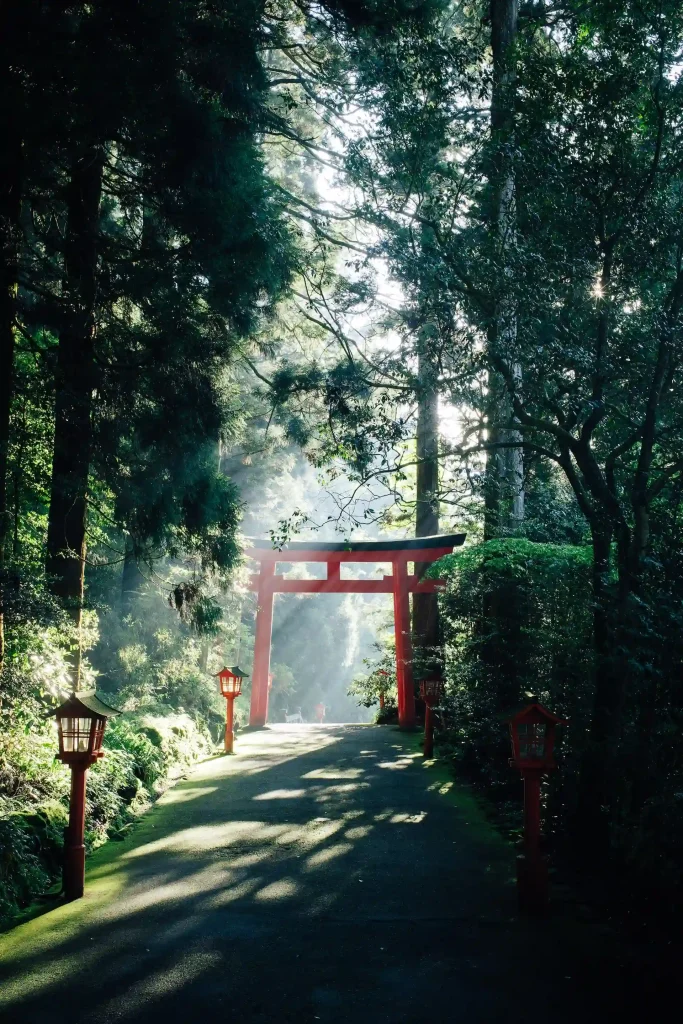
12. 風情 (Fuzei)
Charm and Atmosphere
“Fuzei” is a word that is used to describe the charm and atmosphere of a place or thing. It can refer to the unique qualities that make something special, or the ambiance that surrounds a particular situation.
When I hear this word, I am reminded of the charming and quaint streets of a traditional Japanese village.
13. 物の哀れ (Mono no aware)
Transience of Things
This is one of my favorite Japanese words, It encapsulates my state of mind when I think of life. “Mono no aware” is a phrase that describes the transience and impermanence of all things.
It is a reminder that everything in life is temporary, and that we should appreciate the beauty and meaning of each moment.
When I think of this phrase, I am reminded of the fleeting beauty of cherry blossom season in Japan.
14. 侘び寂び (Wabi-sabi)
Imperfect Beauty
“Wabi-sabi” is a word that is used to describe the beauty of imperfection. It is a reminder that flaws and irregularities can add to the charm and uniqueness of an object or situation.
When I hear this word, I am reminded of the beauty of a weathered and worn piece of pottery and the many conversations about the beauty in imperfetcion with my cousin Toan who embodies this word so perfectly.

15. 心地よい (Kokochiyoi)
Comfortable and Pleasant
“Kokochiyoi” is a word that is used to describe a sense of comfort and pleasantness. It can refer to the feeling of being at ease in a particular environment,
or the sense of relaxation that comes from doing something enjoyable. When I think of “Kokochiyoi”, I am reminded of the cozy comfort of a Japanese hot spring.
16. 森林浴 (Shinrinyoku)
Forest Bathing
“Shinrinyoku” is a phrase that refers to the practice of immersing oneself in the natural environment of a forest.
It is a way of reconnecting with nature and finding a sense of calm and tranquility.
When I hear this phrase, I am reminded of the peacefulness of a Japanese forest in autumn.
17. 縁 (En)
Fate and Connection
“En” is a word that refers to the idea of fate or connection between people and events.
It is often used to describe the idea that our lives are interconnected and that we are brought together with certain people and experiences for a reason.
This word reminds me of the importance of cherishing our relationships and the small moments that bring us together.
It also highlights the idea that there is often a greater purpose or meaning to the connections we make in life and we encounter on our travels.
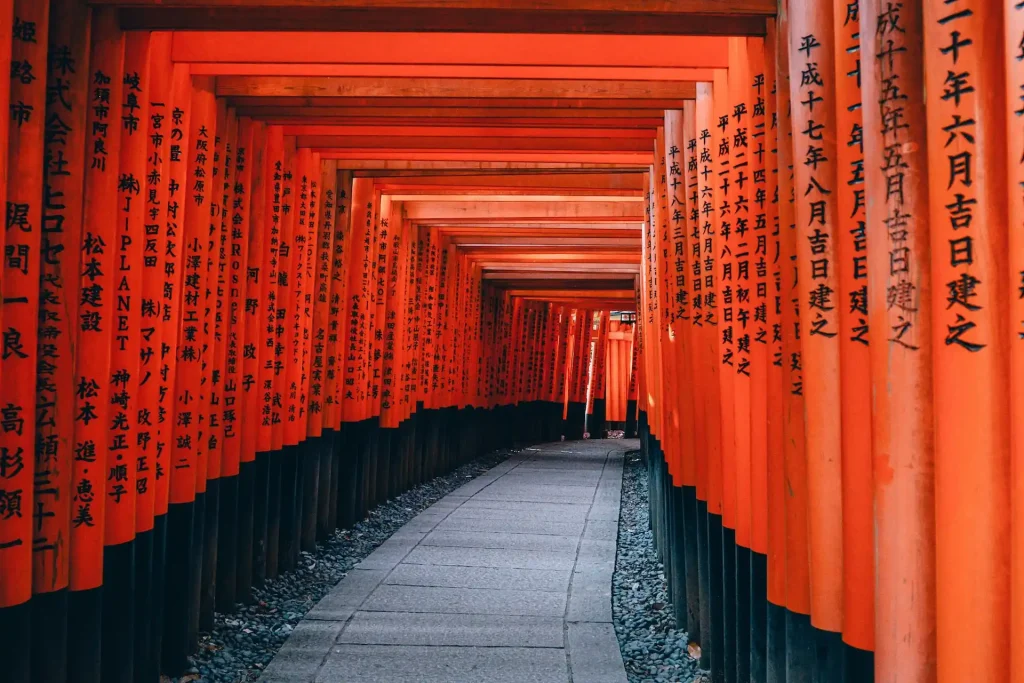
18. こうふく(Kōfuku)
Happiness, Joy
The Japanese word 幸福 (Kōfuku) describes a sense of happiness or joy. It is often used to describe the feeling of contentment and satisfaction in one’s life.
This word resonates with me because I think happiness does come from being happy with what we have and only we can create our own happiness.
19. 旅立ち (Tabidachi)
Departure and New Beginnings
“Tabidachi” is a word that is used to describe the departure or beginning of a new journey or adventure. It can refer to the excitement and anticipation of setting out on a new path, or the sadness and nostalgia of leaving behind old friends and memories. When I hear this word, I am reminded of the bittersweet feeling of saying goodbye to my dad at the end of 2019 when I had a chance to see him in Czechia after 20 years, and returning home after that trip.
20. 空海 (Kuukai)
Open Sea
“Kuukai” is a word that refers to the vast, open sea. It is associated with the feelings of freedom, expansiveness, and possibility. When I hear this word, I am reminded of the endless potential and boundless energy of the natural world, and the importance of exploring and embracing new experiences and opportunities.
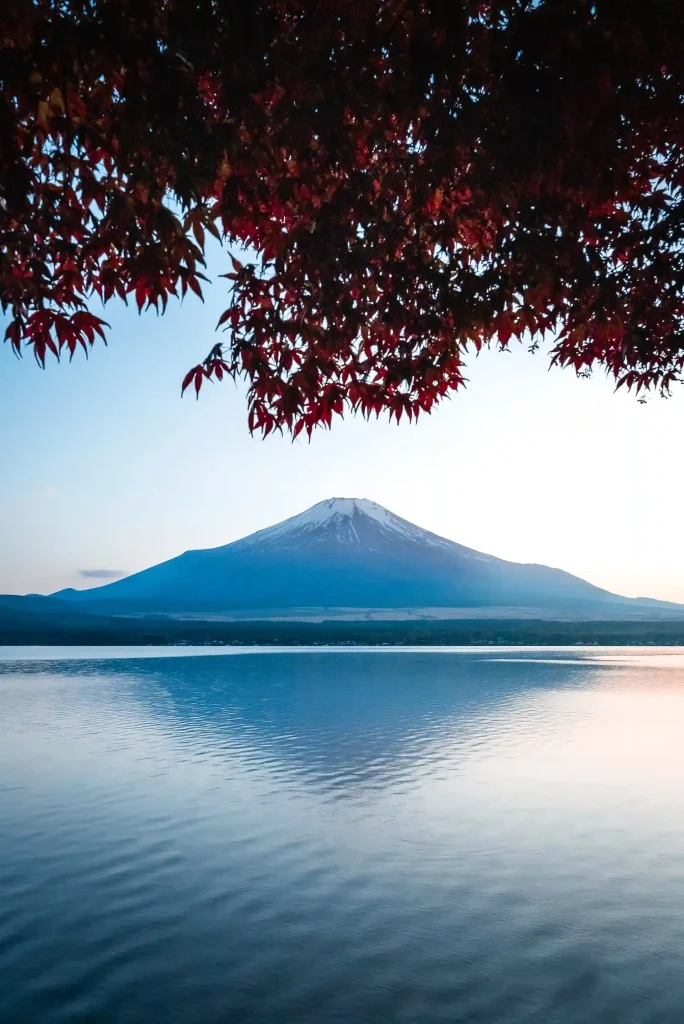
21. 美しい (utsukushii)
Beautiful
Another aesthetic japanese word is “utsukushii” . It’ss how you say profoundly beautiful in Japanese. This word sounds so aesthetic and beautiful. The meaning behind it should be reserved for when you feel something is truly breathtaking.
22. Natsukashii (懐かしい)
Sentimental longing
A very aesthetic word in it’s spelling. It means something that invokes nostalgia and sentimental longing. Example: “Hearing that song filled me with natsukashii for my childhood days.”
23. Omoiyari (思いやり)
Thoughfulness
A beautiful and aesthetic Japanese word with a deep meaning. It translates to thoughtfulness and compassion for others. Example: “The volunteers demonstrated great omoiyari, going out of their way to help those in need.”
24. Omotenashi (おもてなし)
Japanese hospitality
Japanese aesthetic words that expresses Japanese hospitality, providing service that goes beyond expectations. Example: “The ryokan staff welcomed us with excellent omotenashi, making our stay unforgettable.”
25. Kintsugi (金継ぎ)
aesthetic Japanese pottery artform
a beautiful Japanese word and artform. It’s the aesthetic word for describing the art of repairing broken pottery by mending the areas of breakage with lacquer dusted or mixed with powdered gold, silver, or platinum. Example: “The broken bowl was made even more beautiful through kintsugi, its cracks filled with shimmering gold.”
26. Kokuhaku (告白)
Confessing romantic feelings
Japanese words with beautiful meanings that describe the act of confessing romantic feelings to someone. Example: “He finally gathered his courage to make a kokuhaku to his longtime crush.”

27. Ichigo ichie (一期一会)
One of Japanese words with beautiful meanings that translates to treasuring once-in-a-lifetime encounters; appreciating any meeting as being a unique occasion that will never recur. Example: “Every concert is ichigo ichie, a special experience to treasure.”
28. Omoiyari (思いやり)
Thoughtfulness and compassion for others. Example: “The volunteers demonstrated great omoiyari, going out of their way to help those in need.” I love how aesthetic this japanese word sounds.
29. Gaman (我慢)
Enduring adversity and hardship with patience, dignity, and resilience. Example: “Despite all the challenges, she persevered with gaman.”
30. Enryo (遠慮)
The tendency to hesitate or be reserved in order to avoid being rude or causing offense. Example: “Out of enryo, she held back from correcting her friend’s mistake in front of others.”
31. Otsukaresama (お疲れ様)
Another Japanese word aesthetic meaning : Expressing appreciation for someone’s hard work. Example: “Otsukaresama after the long hours you put in this week to finish the project.”
32. 透徹 (tōtetsu)
Penetration: Deeply discerning and comprehending the truth. Insight into the essence of things. I love how aesthetic this japanese word sounds.
33. 逃げ水 (nige-mizu)
Fleeing water: Time irretrievably flows by. Life cannot be grasped any more than fleeting water.
34. 透明 (tōmei)
This aesthetic Japanese words hold the meaning of Clarity: Valuing openness, honesty and purity of spirit. Clear truth untainted by falsity and obscurity. I love how this Japanese words is written so aestheticly. The translation is also pretty.
35. 美学 (bigaku)
This aesthetic Japanese words hold the meaning of Aesthetics: Appreciating and creating beauty enhances and gives meaning to life
36. 幸 (sachi)
This aesthetic Japanese words hold the meaning of Happiness: Joy comes from harmonious relations, appreciating beauty and life’s blessings however humble.
37. 勤労 (kinrō)
This aesthetic Japanese words hold the meaning of Hard work: Finding purpose and dignity through disciplined effort. Work provides meaning and self-worth. I love how aesthetic this japanese word sounds.
38. 優しさ (yasashisa)
This aesthetic Japanese words hold the meaning of Kindness: Showing selfless care and compassion for others. Valuing empathy and human bonds.
39. 笑顔 (egao)
Smile: A smile represents joy, optimism, gratitude. Bringing happiness to others and oneself.
Other Inspiring Articles
japanese words aesthetic
The Japanese language is a beautiful and complicated language that has so much history and nuance.
Japanese words often have an elegant aesthetic beauty stemming from the nature of the language. The grammatical structure of Japanese allows for creative word order and omitting subjects, creating ambiguity and space for interpretation.
This adds a sense of suggestiveness and profundity. The phonetic qualities of Japanese also contribute to the aesthetic feeling – there are very few harsh consonant clusters, giving the language a smooth, melodic flow.
Visually aesthetic Japanese words, the logographic kanji characters used to write Japanese words possess graceful brushstroke patterns that look like artworks unto themselves. The balance of geometric squared kanji and curving hiragana script creates appealing negative space on the page. The layers of meaning in the logographs, which represent ideas more than sounds, add depth and nuance.
Culturally, the Japanese appreciation of nature, impermanence, and emotion imbue words with poignancy and delicate emotional shades. Words like mono no aware (pathos of things), wabi-sabi (rustic beauty), and yūgen (graceful mystery) express unspeakable depths and meanings.
The spare style preferred in Japanese poetry and literature also contributes to the aesthetic, with each word carefully chosen to evoke emotion.
Overall, the audio, visual, semantic, and cultural qualities of the Japanese language allow individual words to carry rich implications and elegant undertones.
The aesthetics of Japanese words resonate with and awaken the senses when thoughtfully savored. Their concentrated depth reveals profound meaning and artistry in their linguistic construction.
About The Japanese Aesthetic Words and Letters
The Japanese language has a long, culturally significant history. Here is an overview of the origins and development of the Japanese writing system:
In conclusion
the Japanese language is full of beautiful and meaningful words that reflect the country’s rich cultural heritage and unique worldview that resonates with me. From the elegant simplicity of “Iki” to the imperfection beauty of “Wabi-sabi” to the intense passion of “Koi”, these aesthetic Japanese words remind us of the importance of finding beauty and meaning in the world around us. Whether we are traveling in Japan, or simply looking for new ways to appreciate the world, these beautiful Japanese words are sure to inspire and uplift us.
- Japanese originated from Old Japanese, which was brought by migrants from the mainland around the 4th century BCE. Chinese had a strong influence on the language.
- At first, Chinese characters called kanji were adopted for writing. Kanji were developed in China and contain semantic and phonetic elements. Thousands of kanji are still used in modern Japanese.
- Around the 5th century CE, the Japanese developed their own writing systems: hiragana and katakana. These syllabaries each contain 46 basic characters representing different syllables.
- Hiragana was derived from cursive forms of kanji and used by women, who were often denied formal education. It became widely adopted by the 10th century.
- Katakana was developed by Buddhist monks to annotate readings and pronunciations of kanji in texts. It was also used to write foreign words phonetically.
- The combination of the logographic kanji and syllabic hiragana and katakana forms the basis of the modern Japanese writing system. This hybrid system allows for concise yet nuanced writing.
- After WWII, hiragana became dominant for writing native Japanese words, while katakana is used for foreign loanwords and onomatopoeia. Kanji remain essential for formal writing.
- The Japanese language reflects cultural values like politeness, formality, and harmony. The levels of honorific language encode social roles and hierarchy.
- Japanese also has strong aesthetic elements, with kanji contributing visual beauty and hiragana providing flowing curves. This complements the elegant minimalism valued in Japanese arts.
More Japan Articles
FAQ
Still have questions?
If you cannot find an answer to your question in our FAQ, you can always ask in the comments below!






